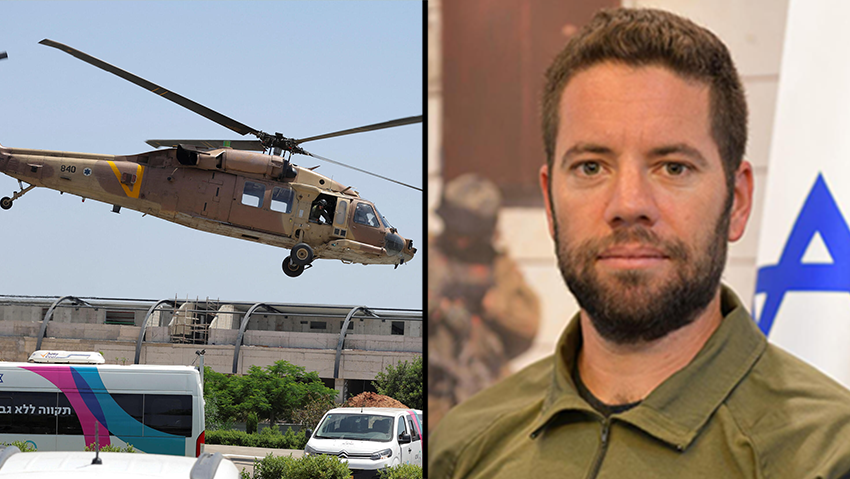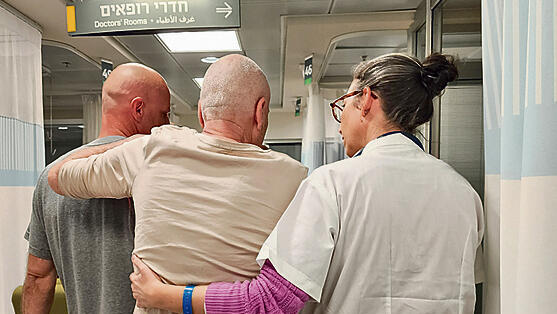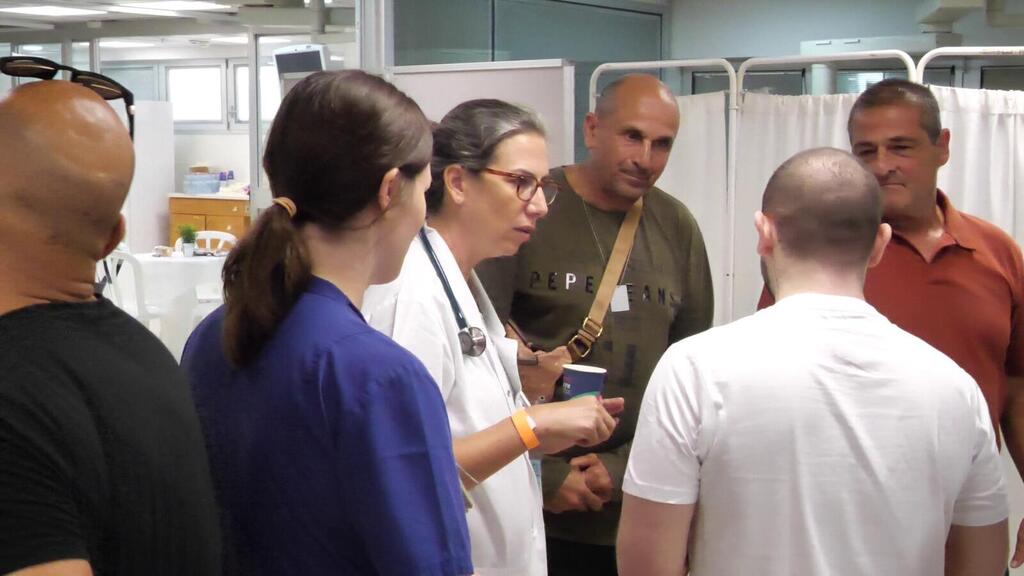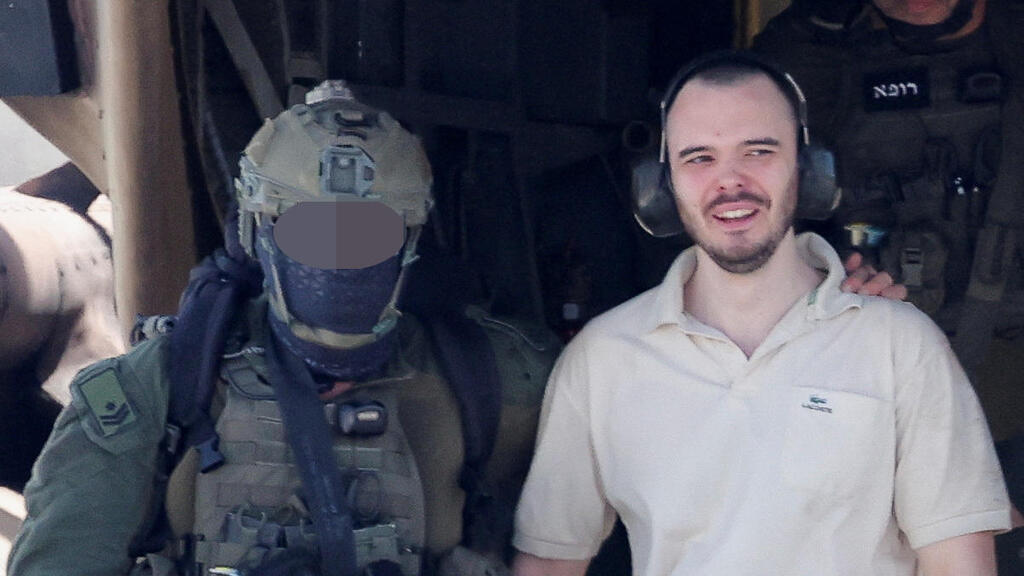Dr. Noya Shilo, who’s responsible for the medical care of hostages at Sheba Hospital was at a family gathering in Mikhmoret last Saturday when she was urgently called back to work. Just two words made her drop everything and rush back to central Israel: Hostages at Sheba.
"I left my kids at the beach with my sisters and raced to my car," she recalls. "Within an hour and a half, I was at Tel Hashomer. When the beach lifeguard informed the swimmers about the rescued hostages, my son told the family, 'That's my mom taking care of them.'"
6 View gallery
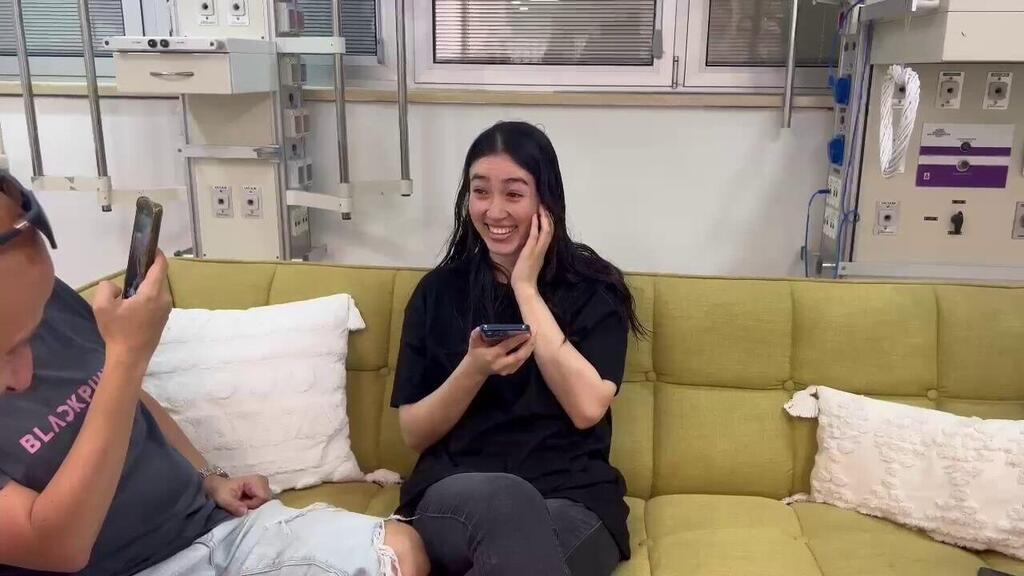

Noa Argamani reunites with her family in the hospital after being rescued from the Gaza Strip
(Photo: President's Office)
To everyone's relief, the four hostages returned to Israel on their own two feet, seemingly in good condition, smiling all around. But the reality, says Dr. Shilo, is much more complex than it appears. "Because they are young, they had some resilience," she explains. "They also had a lot of resourcefulness, luck, faith, protection—people can call it what they want. They came with the consequences and burden of a violent abduction and eight months of captivity but without immediate physical injuries requiring an urgent response."
Noa Argamani upon her arrival at Sheba
"There might not have been an immediate danger to their lives, but their injuries are extraordinarily deep, both physically and mentally. I don't think one needs to be a seasoned professional to understand that someone who has gone through such a terrible and traumatic experience cannot be in a good state. They were in prison. Abused with physical injuries. Isolation. Physical restraint. Violence. Their eyes and hands were tied. Nutritionally, they endured periods of starvation with a very monotonous and protein-deficient diet. The effects of these experiences are evident. What appears on the outside is just the tip of the iceberg. They were in a flood of adrenaline, in a fight-or-flight state. The whole body mobilizes in such a state to function. And, of course, there was the euphoria of rescue, mixed with the terrible pain of knowing that someone lost their life to save them.
The resuscitation attempts of Arnon Zamora, the Yamam fighter who was killed in the operation, took place in the trauma rooms in the emergency department while the hostages were nearby. It quickly became news.
"You can see they've been through severe traumas, both physical and psychological. We also know they haven't moved into the post-trauma phase because the event isn't over for them. Until everyone returns, their trauma continues. Each return is a trigger for those who came back earlier. These things are revealed slowly. We don't demand answers from them. Information is uncovered over time, and we continue to follow up with the previous returnees. Issues arise and will continue to arise. It takes time. We will support them for the rest of their lives and help them deal with whatever comes."
Still, you mentioned that after eight months in Gaza, there might have been a positive surprise. "Our profession requires us to prepare for the worst-case scenario. We were ready to provide any type of treatment to the returnees, even connecting them to an ECMO machine (which replaces heart and lung function). Our team includes gynecologists, and we prepared extensively for scenarios of sexual assault, the possibility of pregnant women, and returnees coming back to Israel with babies.
"When you prepare for the worst, you are often pleasantly surprised. But looking at these people and saying 'they don't look like this or that' is doing them a terrible injustice. It's a form of trauma denial. In my opinion, it's no less harmful than claiming that no sexual assaults occurred on October 7.
Recovering from what happened to them will be a lifelong challenge
For almost eight months, the Sheba returnee facility has been on standby, waiting for returnees to fill it. The intensive care unit is equipped with the best advanced medical equipment for any emergency, under close and strict medical supervision, but enveloped in comforting softness: family seating areas, hospital beds with colorful blankets, pastel-colored carpets, comfortable shower slippers from the world of bed-and-breakfasts, all waiting to soften the steps of those who walked barefoot, beaten, and bleeding through the streets of Gaza. Decorative pillows hide the hospital's stiff ones, and on them is a toiletry bag with the words "Boundless Hope" printed on it. Cheerful towels and a carefully chosen purple hairbrush aim to restore a bit of the home feeling to people who lost their homes and entire worlds on Simchat Torah. Each returnee receives a bag with new clothes and personal items.
Too few times—only three so far—has this facility been activated: during the first and only prisoner exchange deal in November 2023. The rescue operation of Louis Har and Fernando Marman, who arrived here in February. And this past week. Within minutes of notice, the facility opens, and a flurry of activity fills the empty hallways in anticipation of the arriving guests. "The preparations here are very intense; we all want to feel like we're doing something for the returnees, not passively waiting for them," describes Shilo. "Medicine is a profession of action; of DOING, not of BEING."
When the need arose to prepare for the hostages' return, with the array of medical and psychological issues they were suffering from, the hospital teams had to get ready for a new type of medicine that didn't exist before and had no experience worldwide. It's pioneering and critical disaster medicine, with no room for error. Among other things, the teams at the National Center practiced simulations of various scenarios: from treating sexually assaulted women, to returnees who can not communicate, to handling mental crises. They were also instructed to set aside their personal emotions to avoid burdening the patients.
6 View gallery
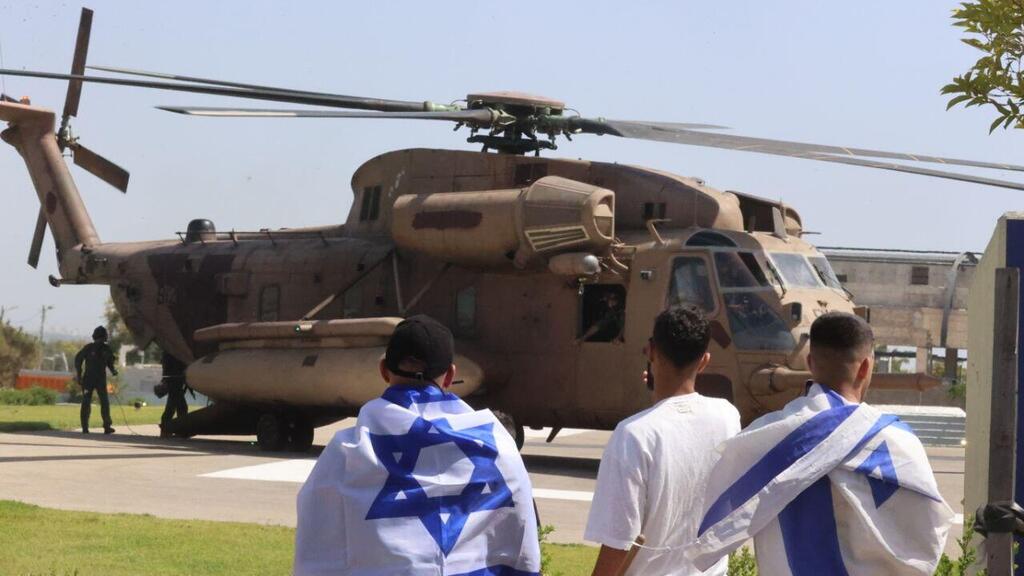

IDF helicopter in which the hostages were brought back to Israel
(Photo: Moti Kimchi)
"We doctors love working based on facts, on research that has been done, things that are documented in literature," says Shilo. "In this case, contrary to everything we were accustomed to, we had to reinvent medicine. From how this facility should look, to the training the teams need before the patients' arrival, to how we should approach them. We constantly refine and refresh these procedures, never stopping our vigilance.
"Very early on, we understood that their injuries are multi-systemic, both physical and psychological, so the treatment must be multi-systemic. Naturally, medicine works in divided fields. Here, we work together, physical health professionals and mental health professionals, as one unit. We strive for minimal staff turnover. We are constantly communicating with each other. This approach makes sense because the issues are not truly separated. The body manifests in the mind, and the mind manifests in the body. Everything intertwines."
Preparations for the return of the hostages extended down to the terminology used. They are referred to here with a single word that combines a simple fact with hope: "returnees." The words "hostage" or "captive" are never heard here, not even in the staff's internal conversations.
"Words have a lot of power, and the way we tell ourselves the story is very significant in how we deal with it," says Shilo. "The story we tell them acknowledges the trauma while emphasizing resilience, the ability to recover and continue with life. To me, this is very significant. Calling them captives highlights the past. Calling them returnees emphasizes the present and future, marking the shift from trauma to recovery, from harm to growth and healing."
Noa Argamani arrived first, wrapped in a bulletproof vest, accompanied by a military doctor. The three men arrived shortly after. After a brief assessment in the emergency room, she was transferred to this facility for further evaluation and treatment. Throughout this time, only a few staff members approached her, most of them women.
The mental health professionals waited on the sidelines and did not approach her at this stage. After a brief conversation with a dietitian who confirmed that the nutritional status of the four allowed them to eat, one of the returnees requested food not on the hospital's regular menu. "I'm dying for shawarma," said Almog Meir Jan to the surprised staff. The unusual request was immediately handled, after receiving medical approval, and the shawarma was swiftly brought to the facility.
"We approach the returnees with utmost humanity, flexibility, and humility," says Shilo, who normally serves as the deputy head of Internal Medicine Department E and was chosen for this special role in the first round. "This is primarily a psychological event. My role is to be there, one step behind. To ensure there are no medical catastrophes and to let the psychologists, psychiatrists, and social workers do their part. To gently weave between the seams."
How do you approach someone who has returned from captivity and it's not yet clear what exactly they went through? "Very quietly. I always introduce myself by my first name, especially here. I ask how they are feeling, if they are in pain, if they need anything, and gently respond to what comes up. The care of the returnees relies heavily on our clinical intuition.
Experienced doctors and nurses were selected for this voluntarily. All have extensive experience. We observe the returnees, noticing their color, speech, and breathing. If I'm very worried about someone, I stand very close behind them and examine them without words, even before speaking or touching them. And if I am concerned because a nurse whispered to me that their pulse was very high, I just place a hand on their wrist to feel the pulse. No stethoscope, no instruments.
"Blood tests are done much later when it is suitable and with permission. When they give the 'okay'. The routine we are used to - first the emergency doctor, then hospitalization, then taking vitals and tests - does not exist here. The routines are reduced to the bare minimum and all are done with consent and explanations. The last thing I want is to stick a needle into any of them or do something painful."
The hospitalization here, serving as a kind of bridge between their time in Gaza and the continuation of their lives, is intended to be as short as possible. However, those who choose can stay longer. "Physically and mentally, there are active problems that need attention. On the other hand, we don't want to keep them in the hospital. So, we will keep them here for the minimum time required to address the most important and urgent issues, then stagger their discharge: from home hospitalization under the supervision of our at-home hospitalization team to follow-up clinic treatment. Whatever is needed at the frequency that suits them. We tailor to each one what they need."
The returnees, she says, receive this package "willingly and with relief. Each takes what is right for them." But the staff also needs the security that this new treatment approach provides. "We went through a very significant learning process, from the November and December phases until now. The framework we created, for receiving them under very inclusive and flexible therapeutic conditions, made us feel more confident in what we were doing. At first, the staff had a lot of fear. What will we encounter, and how will we handle it? In one of the last meetings, I told them I feel like we have been preparing for this mission our whole lives. Each of us brings to this role everything we have to offer as human beings, as professionals and as friends, and we distill this into the best care we can provide."
"Even those who seem to be of normal weight are malnourished due to a lack of essential nutrients. Because of the protein deficiency, they came with significant muscle mass loss. There are deficiencies in vitamins and minerals."
Despite the intensive preparations and readiness for any scenario, the challenges of treating the returnees never cease to surprise. "Over time, we understood that one of the most important things is how to provide them with the information about what happened while they were away," she says. "Each quickly received a phone and internet access, and the staff talked around them, but there were basic things they didn't know. For instance, the concept of a 'nova'. They didn't know the extent of the damage, or what happened in the country. They didn't understand the significance of the war."
"We quickly realized that when information was received in an unregulated manner, it was very traumatic, terrifying, and apocalyptic for them. Therefore, we instructed everyone not to assume that the returnees knew what happened because they knew nothing. I tell the returnees that while they were gone, many difficult and painful things happened, but there were also many good things, such as mutual support, mobilization, and the resilience of our society. I recommend they absorb the information slowly and gradually, rather than trying to consume everything at once."
How do you inform someone returning that some of their family members or friends are no longer alive? "This is the biggest challenge in the whole situation. Sometimes the news tells itself, through who is not present in the room. Just this week, on one side of the facility, they celebrated Jacob Argamani's birthday, while on the other side, they informed Almog Meir Jan that his father had passed away. The cries of joy mixed with the cries of sorrow. We need to let these contradictions coexist while giving the necessary attention."
So far 37 returnees; six men, twenty-two women, and nine children have been treated here. Most have returned to life outside, with two still hospitalized at Sheba. One has never been home due to her condition.
Trauma of the returnees, Shilo explains, has several components. The first is the violent kidnapping, which in some cases involved severe gunshot wounds and deep burns. The second is captivity in inhumane conditions: lack of movement, light, and air, poor nutrition, and lack of mobility. Lack of clean water and poor sanitary conditions led to recurring infections. This list, Shilo says, also includes weight loss and nutritional deficiencies, as well as muscle mass depletion due to reliance on available food, mainly carbohydrates.
"Even those who appear to be of normal weight are malnourished due to the lack of essential nutrients," says Shilo. "Because of the protein deficiency, they arrived with significant muscle mass loss. There are deficiencies in vitamins and minerals. All these issues are identified in lab tests and corrected."
The third component of the medical challenge is the lack of treatment for chronic diseases and conditions that the older hostages suffered from, which quickly deteriorated in the harsh conditions they endured: heart and kidney diseases, and thyroid imbalance. More than a third of the returnees treated here developed deep vein thrombosis and pulmonary embolisms, dramatic and life-threatening conditions, due to their inability to move. The most severe case is of a woman who suffered from high blood pressure that caused an aortic aneurysm, requiring complex heart surgery. "In this area, there are very significant complications," says Shilo.
For the six latest returnees, the last component of the trauma is the rescue under fire in a dramatic and risky military operation. "In some ways, these people were kidnapped twice," says Shilo. "They were kidnapped to Gaza and then 'kidnapped' back home. They are incredibly grateful, but their military rescue was not a simple experience. Additionally, they feel the pain of the blood price for their return. They feel terrible pain that people lost their lives to save them.
The combination of all these elements requires special attention
Dr. Shilo, 45, an internist by profession, married and a mother of three, established a podcast channel called "Medicine from Within" where she has heart-to-heart talks with medical professionals about the profession. She defines the treatment of the returnees as the most important experience of her professional life. "It is a great privilege to treat them, a life-changing experience. Everything else was a prelude to this event. It highlighted how crucial our impact as medical professionals is on our patients' lives. The way we approach and talk to a person leaves a mark on them. It can be for better or for worse. We can exacerbate a difficult situation into a traumatic one, or we can remove the sting of the trauma, wrapping it in a protective layer. That is our goal."
She wants to take the unique experience gained in the returnees' facility into "regular" medicine. "I want to find a human-centered approach to medicine, as we do with the returnees, on a large scale in public health," she says. "To develop technological tools that will allow us to make medicine smarter, more knowledgeable, freeing up medical professionals to do what they do best: heal. The kind of medical professionals we would want to treat us and our loved ones." Together with psychiatrist Dr. Miki Pollak, she recently founded the Returnees Clinic at Sheba, where long-term medical follow-up continues for those who have returned. Everyone discharged from hospitalization receives a warm hug from her and her private phone number. "I told them that until they fire me, I am their doctor for life. They are stuck with me."
Do you see signs of recovery from the trauma in them?
"Good question. It's hard to give a general assessment or an average. Physically, they are undoubtedly getting stronger. Psychologically, some processes still require a lot of work. It very much depends on the resilience of each individual, their condition before the kidnapping, and how much inner strength they have.
It also depends on the family composition, who they went through it with, and how the family was affected. And I would like to think that to a small extent, it also depends on how we treated them upon their return."
Is there a chance they will ever return to being whole, as they were before?
"This is a life-changing event. Their life path has changed. Those who returned are very much aware of the miracle. They saw a lot of death, and despite that, their lives were saved. This is very, very dominant in their feelings. Perhaps surprisingly, from the conversations I've had with the returnees, they form some kind of connection with the other side, because they spent a very long time in Gaza. They know what it's like to live there, under constant attacks, in conditions of hunger and thirst. It is imprinted on their bodies. There is a sort of merging of narratives. They are Israelis who saw Gaza from the inside, and they deeply understand this reality. Of course, I don't assign them any role other than to take care of themselves and see how they survive this."
Did I understand correctly? After months in captivity, in violent conditions of abuse and danger, you don't hear words of hatred from our returnees? "I hear the entire spectrum of things you can imagine. Everything has a place, and every feeling is legitimate. But my thoughts didn't come from a vacuum. They came from conversations I've had with these people and things
I've heard from them. They fill me with inspiration. People with incredible resilience, with amazing sensitivity, and with profound wisdom. From the wish that this war will end, and peace and quiet will follow. I feel that the fact these people can see reality from different perspectives can serve as a bridge between us and them. It is a wish of hope."



